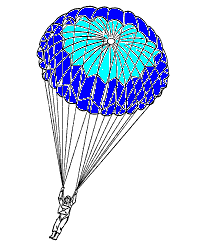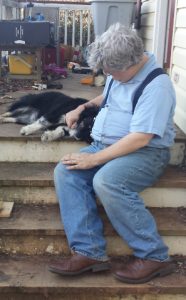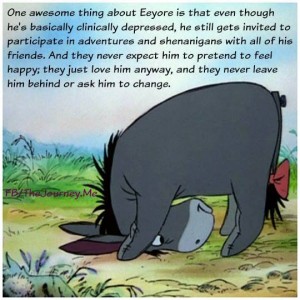A postmortem of my career as a librarian, Part 1
One of the things I learned during the last year was that I do not, and never have had much affinity for career management. I feel that the majority of the professional decisions I made during my 25 year journey proved to be unwise.
Let’s go back to 1991, when I chose to enter the library and information science profession. Before I get started I need to say that this is difficult for me to address. Just about every book or article about career management, or every career or life coach, will ultimately ask questions about what we want, what our dreams are, or what we love to do. They will also suggest we choose a field or profession that “speaks” to us, or involves something that we love unconditionally, and are prepared to spend the rest of our working lives doing (to one degree or another).
I was never able to answer those questions. For starters, there wasn’t really any profession or vocation that “spoke” to me. What did “speak” to me was the need for a vocation that would allow me to pursue what I wanted from life. But as for an occupation that I truly loved or wanted to enter, that changed every fortnight. My interests seemed to bounce around like a swarm of bees, moving from one place to another, and never holding still for long. I could never answer that age old question of “what do I want to do when I grow up.”
And this created a real problem. I was 24 years old and had my bachelor’s degree, and it was time for me to choose a career. I had reached that point in my life, and before I could make any other decision, I needed to choose a career path. This wasn’t negotiable. It was how I was brought up (for better or worse), so it was what I had to do. Fumbling around the world, drifting from one job to another was not an acceptable option. But my interests were so fickle and mercurial that I could never make a choice. Because my interest shifted around so much, I was compelled to start ignoring many of them. I couldn’t base a major life decision on something that was so unstable! To do so would have been totally irresponsible. But a decision simply had to be made, and it couldn’t wait. (Or so I thought at the time.)
This created another problem. I have never seen what I do for a living and what I like to do as ever being the same thing. I don’t know if there is anything in the human experience that appeals to me so much that I would be willing to make it the core of my life. I was also pretty sure that whatever I do for a living would periodically make me angry, and lead to resentment. Many of the things I greatly enjoyed, like music and writing, needed to remain safely in the “hobbies” column. The things I love to do and what I do to support myself have never been and never could be the same thing.
When I apply hindsight to this period of my life, and then look at the events that followed, I found that I never made a career decision based on what I wanted, what I loved to do, or what my dreams were. Ever! My decisions have always been based on what was prudent at the time, what had low or manageable risks, and where I stood a good chance of success.
My first major job out of college was as a para-professional cataloger at an academic library, and all things considered I was pretty good at it. I took that core skill set, figured out some possible ways I to apply it, and ran with it. I chose the profession of library cataloger not out of a love for libraries, a fascination for organizing knowledge, or even a passion for books, music, or movies. I became a librarian because it was the prudent decision at that point in my life.
In the fall of 1991 I started working on my master’s degree at the School of Information Science and Policy at the State University of New York at Albany. I enjoyed graduate school, though not as much as undergraduate school. Most of what I learned about the library field was done in a largely practicum style through a graduate assistantship. I also handled the library school newsletter for a semester, and worked part time as an abstracter for a member of the faculty. It seemed to work for me.
But the actual work force proved difficult for me. After graduating with my master of science in 1993, I soon landed a cataloging and abstracting job with a major university. Fairly quickly I found it hard to stay focused. I had grown accustomed to what could be considered a production style approach to cataloging, which could be approached in much the same way an engineering project could be approached. But a lot of the time, that wasn’t what was required of me, and so at times I struggled. But since the job was based on a grant, I knew it wouldn’t last forever, and that I would choose more wisely in the future.
I failed to do so. My next major job was at what I thought was a corporate library position for an academic research foundation. It actually turned out to be a sales and public relations position with some library related duties thrown in. That job was a complete disaster. I lasted only four months before being thrown out into a cold New England winter. That was arguably one of the darkest periods of my life, and I seriously considered suicide.
But I pulled myself back together and landed a contract librarian job with a government agency in Washington, DC. In truth, this job worked out for me. My primary task was to handle cataloging and acquisition tasks with methodical regularity. I became a one man assembly line for catalog information, and for a few years I did just that. I also got along well with my co-workers, so I even had a modest social life. All in all, I was content with it.
Unfortunately, contract positions are inherently temporary, and eventually that position fell to a budget cut. My company moved me to another contract at another agency, doing much the same type of work. And this one also worked, though the environment was a bit toxic, with two contracting companies constantly trying to drive each other out of the picture. But even so, after almost three years I was the head of the cataloging project, with two librarians, three paras, two technicians, and a translator reporting to me. It was actually a pretty good gig, and looking back I suspect it was actually the high point of my career.
The problem was the political climate at that agency. I was constantly being pressured to expand the contract, and help develop more business for the contracting company. These were things I had no real ability at, though I did try. Eventually I found myself caught in the middle of a battle of wills between my company and a few of the federal employees we reported to. No matter how that battle turned out, things didn’t look good for me in the long run. So I started looking to move on.
Note again that I said this job was likely the high point of my career. From this point on, things seemed to either stagnate or deteriorate. My supervisor from that time period would probably say “I told you so.” But I left that job and went to a public library position, which I held for about two years. I was a happier person, because the political mess was gone, but in all honesty the job wasn’t very rewarding one. What I enjoyed was the decent paycheck, and the freedom follow my own interests outside of work. I took that job for personal reasons instead of professional ones. And ultimately it ended badly.
Another budget cut eventually resulted in my position being eliminated, and I was moved to a reference position at one of the branch locations. This was a complete fiasco. I was not suited for working with the public, and the branch manager didn’t want to deal with a re-purposed cataloger. After three months he told me, flat out, that I should look for a new position, because he wanted to remove me, and was going to start setting me up for failure if I remained much longer. I now suspect that the neurological disorder that would eventually ruin me was starting to have an effect, though I don’t think there was any way I could have seen it as anything other than vanilla stress and depression.
When the opportunity presented itself, I returned to the world of contracting. This was another prudent move, in that it kept me working while I figured out what to do next. I took a contract in the library of yet another government agency, and was relieved to be cataloging again. I liked the material I was working with, but my personality didn’t mesh well with my project manager. I think my work pace was too slow for their liking, and my problems with distractions persisted. In hindsight, whatever is amiss with my cerebral cortex was in play by this point.
When that contract expired, I started working for the Library of Congress. At the time I thought I had finally made it. I thought I was set up for life, at an agency with a solid reputation, a certain amount of prestige, and doing what I honestly thought I was best at.
This was in 2003. Lisa and I had gotten married that year, we were planning to start a family, and generally were setting up the foundations for the rest of our lives. I thought I was in a good place. But here too, I was wrong. The culture of the Library of Congress turned out to be very toxic. I was again having trouble focusing, which I attributed to the pressure-cooker environment of the place. But there seemed to be more. Things that were obvious or second nature to some other catalogers, never entered my thinking. I seemed to be running on a completely different frequency from nearly every other cataloger there. But, I thought, so long as I keep getting good evaluations, I should be fine.
I was hired at the GS-9 level of the civil service ladder, which was typical for a cataloger at that agency. The usual promotion path goes to GS-11, then GS-12, and perhaps GS-13 or higher. This is an over simplification, but the Library pretty much forces people to ascend that ladder to at least the GS-12 level. To effectively do that, you need to be running in sync with the rest of the pack. And I wasn’t.
The process of moving to GS-12 proved extremely difficult. At least two of the higher catalogers told me, point blank, that I didn’t seem to have the necessary mindset. I was struggling with the job, and the promotion that I was being railroaded into didn’t seem like a good place to be going. But I was committed to the process, and kept slugging forward.
To complicate things, the Library went through a re-structuring that resulted in my particular unit being disbanded. If memory serves, I was slated to be transferred to one of the book teams; physical sciences, I think. But I wanted to continue working with digital media materials, and most of that was being moved over to the moving image section, which was in the process of re-locating to a recently opened branch location in Culpeper, Virginia. So after a lot of negotiation and maneuvering, I was transferred to the moving image team, and my family and I relocated to Culpeper, Virginia.
Professionally, this would turn out to be my largest, most costly, and final mistake.





